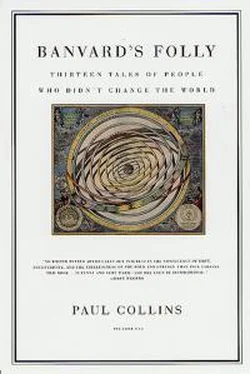But it was too late for soliloquies now. Critics and audiences across Britain were furious at the impudent boy who had made fools of them; those not angry at William simply believed him incapable of writing the forgeries, and were still convinced that it had been Samuel's fraud all along. In either case, no one was interested in seeing the new play written by William Henry Ireland.
And so it went unproduced; no stage was ever graced by its lines, not to this day.
William was not to know this, of course, and the newlywed spent his days after leaving home happily planning his next literary masterpiece. At first he and Alice drifted to the city of Bristol, where William lolled about and didn't get much writing done. One family acquaintance came across a young man walking by the roadside one day in Gloucestershire; it was William. He no longer even had a horse to his name. Yet he happily talked of his writing and of his desire to buy old books again--and then asked to borrow a few guineas.
Alice and William were living on nothing but borrowed money at this point; he borrowed from family and friends alike, telling some that it was to help
finance his father's new book of engravings-an utter lie. Creditors dunned him for payment; in one letter, William pleads with his father, "The principal purport of this letter is to inform you of my wish of getting into some Situation and way of life which may keep me from Starving."
But the only calling for William, in the end, was that of a writer. He published his Account in 1797, and his two plays in 1799; that same year he also published his first novel, The Abbess. He spent the next three decades, until his death in 1835, churning out hack novels and satires that paid the bills but scarcely lived up to the promise of his early work. Tiring of making an honest living, he "discovered" Napoleon's will in 1821, and during 1824
miraculously discovered memoirs and letters by Henry IV of France and Joan of Arc. But these fooled nobody--by now people were wise to William's tricks.
Or so they thought.
William never did lose his skill at quickly jotting off notes in Shakespeare's hand. Long after the frauds had been exposed, Morning Post editor John Taylor fell into conversation with William one night at the theatre. He asked William whether he really had been the forger, whereupon William instantly jotted off two Shakespeare signatures. When Taylor got home, he pulled down a Shakespeare book and compared the two; the likeness was uncanny. But there was a good reason for Ireland's remarkable memory: he had never really stopped forging.
The public may have stopped believing in the papers, but a fascination with the whole affair remained. Copies of William's 1797 Account were quickly snapped up for a shilling apiece, and in later years sometimes cost one guinea at auction. Eventually William found that he no longer had his own copy of Account and had to go to a bookseller to buy a used copy. He was chagrined to discover the price of his own book: "The only copy now in my possession is deficient in one leaf; and for this very mutilated impression I was compelled to pay eighteen shillings; being given to understand ... that I was favoured in its sale at that price, because I was the author of the production."
At the Christie's estate sale for Samuel Ireland's goods in 1801, Samuel's collection of old books and papers, both real and counterfeit, attracted much interest. Among those bidding on the late and ruined antiquarian's worldly effects was a fellow with a strangely familiar face ... Edward Malone. The very man who had destroyed Samuel and his papers now wanted to buy them.
William tried in 1805 to sate the public's interest in the forgeries by publishing a much-expanded account, The Confession of William Henry Ireland.
By now the public had accepted the notion that William had been behind the forgeries, and for some time William had been receiving inquiries from interested collectors: did he still have any of the old Shakespeare forgeries lying around? Perhaps he would like to sell them? The manuscript of Vortigern, say? Might he still have that in his possession?
Oh yes, William would reply. It just so happens that I do.
It just so happened that William always had one in his possession. For ever since the forgeries had been exposed, and become a subject of morbid literary interest, he had been quietly doing something almost dazzlingly postmodern in its sheer ingenuity and conception.
He was making forgeries of the forgeries.
No fewer than seven "original" copies of the manuscript of Vortigern surfaced after William's death, along with a whole array of other copies that he made
of the Shakespeare papers. Each is utterly authentic in appearance; it is impossible to tell which is the original and which is the copy. After all, the collectors were getting them straight from the source, and besides, who'd ever heard of a forgery of a forgery?
Ireland couldn't resist leaving one little hint for his clients. Among Ireland's many books is a bit of satirical verse from 1807, Stultifera Navis: Qua omnium mortalium narratur Stultia; The Modern Ship of Fools. It is an allegorical collection of a ship of fools of every variety, illustrated with a color folding plate inside the front cover. Noticeable among the fools is the figure of one particularly unfortunate fellow.
It is a Book Collector.
If you go today to the recently built reincarnation of the Globe Theatre, you will find one of Ireland's forged copies of a forged letter on display. It is his Heminge deed, the one that once nearly blew William's cover as he stood sweating and nervous in the law office of Albany Wallis. It is not merely a display piece-it is for sale by Bernard Quaritch Ltd., an antiquarian bookseller that has been housed just off Piccadilly Circus for two centuries now; it went into business not long after Ireland's death, and throughout its history it has periodically received bundles of Ireland forgeries from estate sales and the like--the result, probably, of some familial ancestor who eagerly laid out a few pounds to buy an entire batch of "original forgeries"
directly from William.
The forged Heminge letter on display will now set you back l2,750.
According to Quaritch specialist Theodore Hoffman, it's getting harder and harder each year to find Ireland forgeries. The papers themselves are holding up fairly well--he probably used either weak tea or lemon solution over a flame to induce browning, and neither of those would weaken the paper fibers too greatly. But William Henry Ireland, who worked so hard to make his papers look old and rare, has been sentenced to poetic justice--now his papers really are old and rare.
Finding a whole new batch of Ireland meta-forgeries might be worth quite a bit of money to someone. And since Ireland was none too careful or sophisticated in his techniques, it wouldn't be too hard ... wait. The inevitable question is asked of Theodore--might someone be out there now, making a forgery of a forgery of a forgery?
"No, no," he says quickly.
"I don't think so ...."
SYMMES HOLE
Hamilton, Ohio, is a place you could find only by accident, as you're unlikely to go there deliberately. In the 1970's the town changed its name to Hamilton!--a scheme dreamed up by some local Babbitt. When the expected vim, vigor, and pep failed to materialize, the exclamation mark faded away and the dreariness of the unadorned Hamilton returned. But Hamilton--or Hamilton!--has retained one item of interest to passersby.
Under the shade of an old oak in a weedy town park is a simple if enigmatic grave monument--a stone obelisk topped by a granite sphere. This sphere has a large hole drilled through the center. Underneath, amid a crazy quilt of patching concrete, are several bronze plaques, bolted in over original stone inscriptions that were scoured into illegibility by over a century of wind,
Читать дальше











